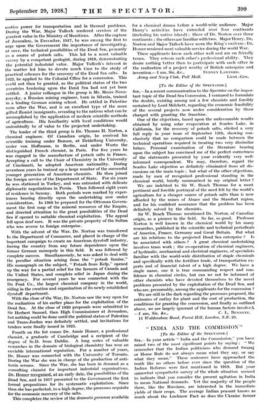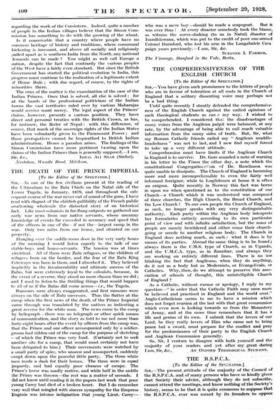" INDIA AND THE COMMISSION" [To the Editor of the
SPECTATOR.] Sne,—In your article India and the Commission," you have raised two of the most significant points by saying : " We remember that the Indian politicians who demand Swaraj or Home Rule do not always mean what they say, or say what they mean." These sentences have approached the truth like no others before ever since the question of the Indian Reforms were first mentioned in 1919. But your somewhat sympathetic survey of the whole situation seemed to indicate that you consider the present agitation in India to mean National demands. Yet the majority of the people there, like the Russians, are interested in the immediate yields of their crops. The average Indian peasant knows as much about the Lucknow Pact as does the Ukraine farmer
regarding the work of the Comintern. Indeed, quite a number of people in the Indian villages believe that the Simon Com- mission has something to do with the growing of the wheat.
Is it conceivable that a country where people have no common heritage of history and traditions, where communal bickering is incessant, and above all socially and religiously pulled apart as is southern India from the North, any national demands can be made ? You might as s well call Europe a nation, despite the fact that contrarily the various peoples of the West have a fairly even standard. But since the British Government has started the political evolution in India, this progress must continue to the realization of a legitimate extent Df Home Rule ; with due regard, of course, to the rights of minorities there.
The crux of the matter is the examination of the arse of the Indian Princes. Once that is solved, all else is solved ; for at the hands of the professional politicians of the Indian towns the vast territories ruled over by various Maharajas would receive scant mercy. The legal aspect of the Princes' claims, however, presents a curious position. They have direct and personal treaties with the British Crown, as has, for instance, the Ruler of Nepal : with this difference, of course, that much of the sovereign rights of the Indian States have been voluntarily given to the Paramount Power ; and those prerogatives cannot be bequeathed to British Indian administration. Hence a paradox arises. The findings of the Simon Commission have more pertinent tearing upon the claims of the Indian Princes than is generally supposed.—I am,





































 Previous page
Previous page